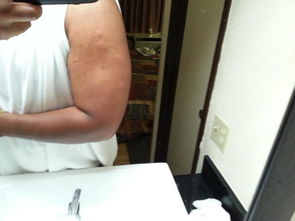Understanding Bug Bites: A Comprehensive Guide
Bug bites can be a common occurrence, especially during the warmer months when insects are most active. Whether you’re dealing with mosquitoes, bed bugs, or even ticks, understanding the nature of these bites is crucial for effective treatment and prevention. In this detailed guide, we’ll delve into the various aspects of bug bites, from their causes to their symptoms and treatment options.
Causes of Bug Bites

Bug bites are caused by the piercing and feeding of insects. Here are some of the most common culprits:
| Insect | Common Bites |
|---|---|
| Mosquitoes | Red, itchy bumps |
| Bed Bugs | Small, flat, red welts |
| Ticks | Red, swollen bumps with a central red dot |
| Bees and Wasps | Painful, red welts with stinger remnants |
These insects inject their saliva into the skin while feeding, which can cause irritation and allergic reactions in some individuals.
Identifying Bug Bites

Identifying bug bites can sometimes be challenging, as they can resemble other skin conditions. However, there are some key characteristics to look for:
-
Location: Bug bites often occur in areas exposed to the skin, such as arms, legs, and face.
-
Appearance: Bites can range from small, red bumps to large, swollen welts.
-
Pattern: Some insects, like bed bugs, leave a linear pattern of bites.
-
Duration: Bug bites can last from a few hours to several days.
Symptoms of Bug Bites

The symptoms of bug bites can vary depending on the type of insect and the individual’s sensitivity. Common symptoms include:
-
Itching: This is often the most immediate symptom, as the insect’s saliva can cause irritation.
-
Redness: The area around the bite may become red and inflamed.
-
Pain: Some bites, particularly those from bees and wasps, can be painful.
-
Swelling: The bite area may swell, especially if there’s an allergic reaction.
-
Blisters: In some cases, the bite may form a blister.
Treatment Options
Most bug bites can be treated at home with over-the-counter remedies. Here are some effective treatment options:
-
Cool Compress: Apply a cool, wet compress to the bite area to reduce swelling and itching.
-
Antihistamines: Over-the-counter antihistamines can help alleviate itching and reduce inflammation.
-
Topical Creams: Calamine lotion or hydrocortisone cream can soothe the skin and reduce itching.
-
Oral Pain Relievers: If the bite is painful, over-the-counter pain relievers like ibuprofen or acetaminophen can help.
Prevention Tips
Preventing bug bites is always better than dealing with them after the fact. Here are some tips to help you avoid these pesky pests:
-
Use Insect Repellent: Apply a DEET-containing insect repellent to exposed skin and clothing.
-
Wear Long-Sleeved Clothing: When possible, wear long sleeves and pants to cover your skin.
-
Check Your Surroundings: Before sitting or lying down in an outdoor area, inspect the area for insects.







